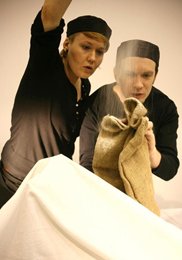This is poor theatre: no real props (unless you count some kitchen utensils and some vegetables), no set (apart from a kitchen table and a sheet), minimal on-off lighting, so it makes significant demands on the actors. They don’t pretend to be puppeteers: they have no puppets. There is no overt attempt to create illusions. They simply make do with what’s in front of them: a wooden spoon that talks to a food mixer, an old sheet that becomes a mountain, two kitchen knives who become local butcher and son.
Joe Moylan and Amy Conroy draw the audience in - they cross the proscenium at first, establish rapport, ensuring that it’s a story they want and not a cookery lesson (though they end up with both) but then as the kitchen utensils and vegetables are brought to life, they become absorbed in the narrative and the collective imagination of actors and audience springs to life. They find the children in themselves, playing the game of make-believe for all it’s worth, and winning a similar level of concentration from the 8-10 year olds, whose rapt attention and impeccable behaviour is so much better than that of many adults. What will Joe and Amy do next? With such scant resources, that’s anyone’s guess. The grasping mayor of the village is a wine bottle, his tyrannical mother is represented by a vinegar bottle – good casting that.
 If there’s a weakness it lies in the fact that they become so absorbed in the story that they let go of the audience a little and some of the work with the utensils lacks clarity, iIn terms of movement and voice - but how can you find fault with the acting skills of a courgette?
If there’s a weakness it lies in the fact that they become so absorbed in the story that they let go of the audience a little and some of the work with the utensils lacks clarity, iIn terms of movement and voice - but how can you find fault with the acting skills of a courgette?
This reworking of an old fable demonstrates how leadership, lateral thinking and cooperation can work wonders. The plot, as if it mattered, revolves round starving mountain villagers, isolated by severe snows - and from each other - in their desperate attempts to hoard the last scraps of food. Enter the stranger, mysteriously penetrating the barrier of snow, an old woman (well actually a canvas bag.) She becomes the catalyst to reveal the self-interest of the villagers (“Hard times make hard hearts”), but with the help of Jim, a young wooden spoon (son of another wooden spoon) she pulls them into a cohesive community. The soup starts with a stone in water but old woman teases ingredients from the secret stashes in the villagers’ houses and it becomes a wholesome feed before the very eyes of the audience. (They actually get to taste it in the foyer afterwards.)
The moral of the fable is abundantly clear - “The better it smelled, the more people wanted to get involved” - and the performers’ decision to open a discussion with the children allows them to address the themes and to come to grips with the theatrical conventions. Púca Puppets have chosen to make a story of hope out of nothing. There is an upbeat message here for recessionary times, the winter of our discontent. Some food for thought there.
Derek West is a part-time grandfather and was accompanied to this production by Lucy (8), who gave the show a five-star rating.